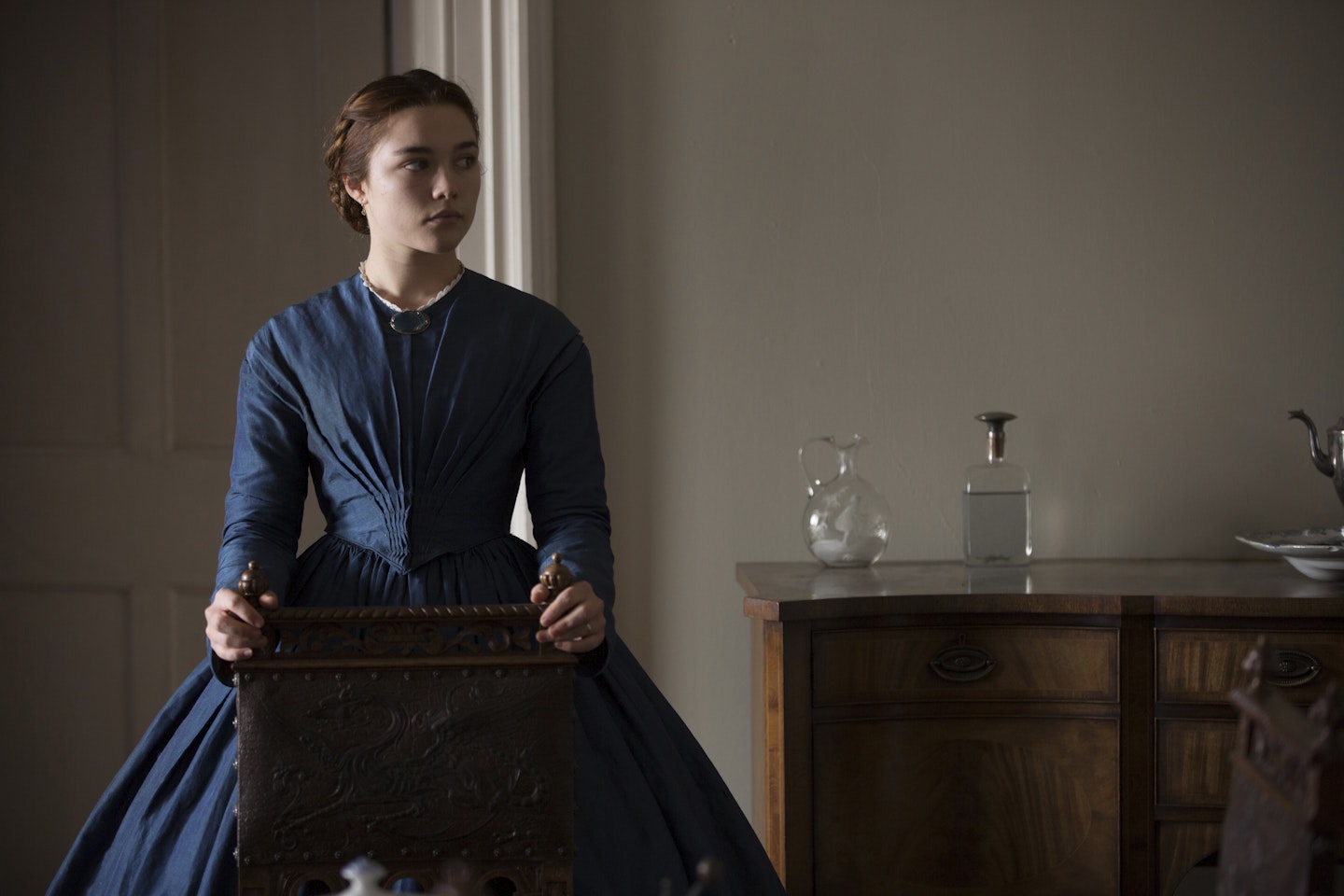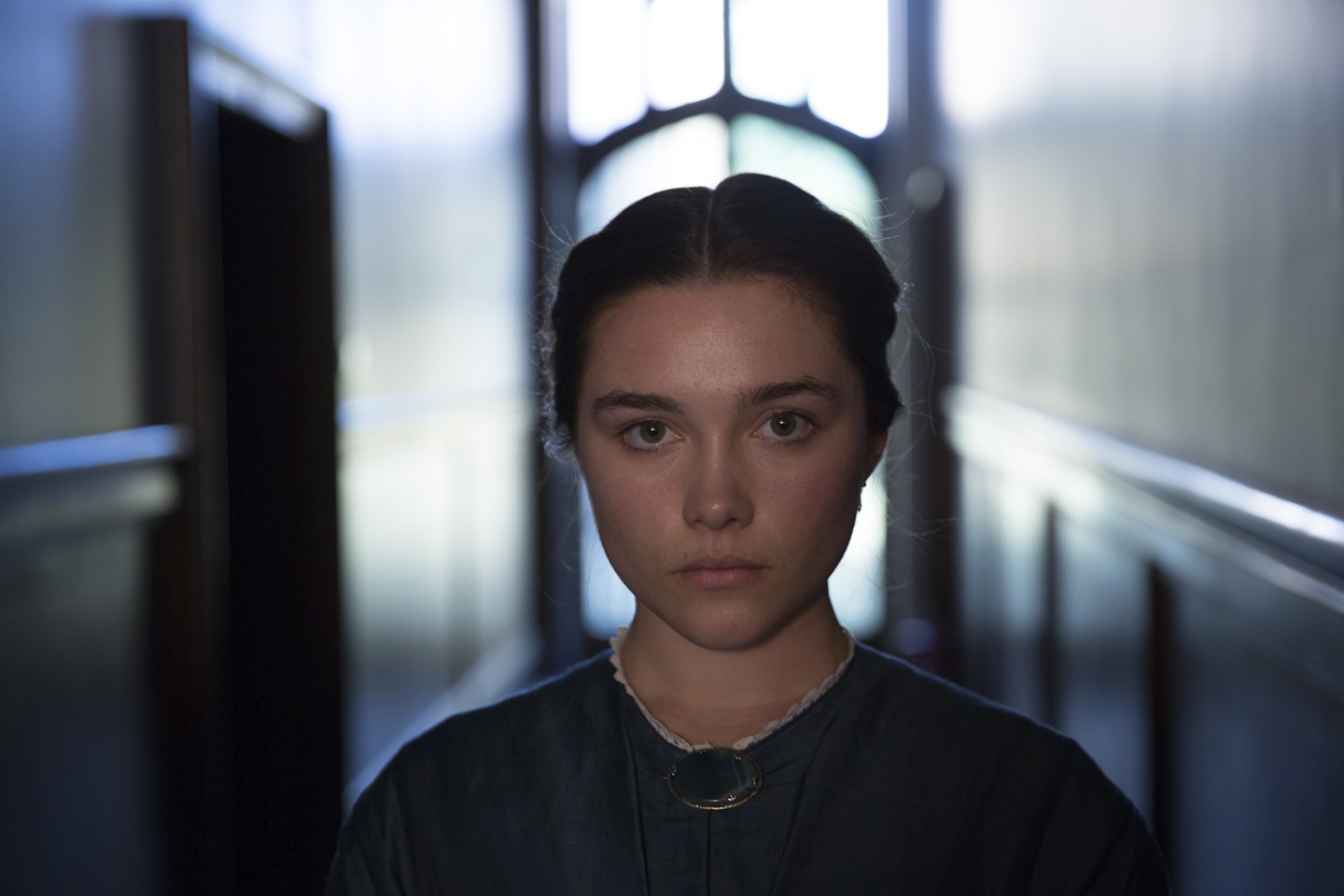Florence Pugh is a name worth remembering. The 21-year-old has made just a handful of appearances on the big and small screen to date, but their pedigree has been impeccable. First came a magnetic turn as a troubled schoolgirl in The Falling, director Carol Morley's haunting take on female hysteria, then a role opposite Anna Friel in ITV's Marcella, then what will surely prove a star-making turn in Lady Macbeth, a bleak and brutal riff on Shakespeare's anti-heroine that rips up the period drama rule book in fascinating ways. It's hardly surprising that the critics are taking notice: the actress was announced as one of BAFTA and Burberry's Breakthrough Brits last autumn, an accolade which recognises the UK's most promising rising stars in film and the arts.
In Lady Macbeth, a re-imaginating of a Russian novella that was in turn inspired by the Shakespeare play, Florence plays Katherine, a young woman forced into a loveless marriage with a much older, psychologically abusive man. A far more intriguing (and disturbing) prospect than your average corseted Victorian heroine, she begins to rebel, first through an affair with a farmhand, then through a series of increasingly dark twist and turns that eventually result in murder. Ahead of the film's release, we sat down with the actress to unpick her latest role...
What was your immediate reaction when you first read this script?
Katherine really stuck out to me, as she should do: she's the majority of the film. I'd never come across a character like this; I'd never come across a script like this. As a young actress, you don't often find roles like this. Immediately, the main thing was that I needed to give this as good a go as I could because she was a brilliant, brilliant character.
What was the audition process like?
When I went in for the first audition, I still thought it was Macbeth from Shakespeare – I hadn’t been given the script yet, just the slides, so I remember looking at those and thinking, “Well, this is a very weird take on Macbeth…” I thought I crashed and burned, but then week by week I’d be given another reading. It was really awesome to know that they saw Katherine in me.
Katherine [the 'Lady Macbeth' of the title] is a very subversive character, especially for a period drama. What was your take on her?
She’s a very modern woman, and I think that’s shocking for an audience: when we see a period drama, we expect to see the women that we’ve seen in hundreds of other period dramas. As it happens, Katherine isn’t that. She’s responding to scenarios in a very modern way, and I think that’s why so many people are excited and confused about this film. Why shouldn’t she act in the way she does? She’s pushed and so she acts out; when other characters attempt to corner her, she surprises them, and surprises the audience. She has a rebellious side to her and then it goes too far.

How did you prepare for this role? Did you look at any other films or performances as a starting point?
I wasn't really inspired by any other films. There was a lot of Katherine already in the script, and then there's obviously a final piece to the puzzle that every actor brings to a role they receive. For me, I'd say that I do have a feisty side, so I tried to incorporate that into Katherine as well. I really loved working with the costumes: we did so many rehearsals of the physical scenes, but everything we tried would get thrown out of the window the moment I would get the corset on. You can't move; you have to adapt to that. That was the best part of the preparation - realising how much that would have affected women's lives. It was a real eye-opener.
Your character does some pretty awful things as the film goes on. How do you go about making the audience identify with someone like Katherine?
I imagined lots of little films going on in my head when I was reading this script, and obviously I knew that we had to want to support her. When you act it out, that's a different ball game: you have to figure out exactly how you're going to make the audience love her, how you're going to make them care for her. I knew that we had to really want her to succeed from the beginning. I thought, well, I can grab the audience in some of the earlier scenes, when she's unloved, she's told to take her clothes off, she's abused in a sense. That was the challenge: how do I make the audience love her, and how do I keep their love throughout the film?
You've been to screenings and film festivals with Lady Macbeth for the past few months. What has the reaction been like?
At lots of the screenings I’ve done so far, people won’t come and talk to me afterwards! There’s a couple of ‘well dones’ but ultimately if there’s a crowd… I think Katherine does scare people, maybe because they’re also scared by themselves: we support her until the end, and it’s only at the last strike where we all go “Oh my god, I’ve been applauding her throughout this entire film, when actually she’s done some really messed up stuff…” It’s that funny feeling you have with yourself as much as the feeling that you have for Katherine.

The film certainly acts as an interesting comment on what is deemed 'appropriate' female behaviour. Was that something you wanted to explore, and do you think having a female writer on board added that extra nuance?
Obviously Alice [Birch, who wrote the screenplay] helped so much with the script, and brought so much to the character - that script was the reason that so many people wanted to be part of this film. For me, it was a massive battle at the beginning because I just thought that so much that happened to [Katherine] and so much that was asked of her was wrong. That was something that [director] Will would have to discuss with me: he'd be like, "yes, but you can't act that way because women of this time just couldn't." In a sense, actually, that's where Katherine and I are quite alike: I don't like being told how to do things. It was brilliant doing those scenes where the men would just imprison me sentence by sentence: it makes Katherine angry, and it made me angry. Pulling those ties wasn't difficult between me and her.
What was it like to watch the film for the first time?
Really intense! For me, the first screening of anything is really horrible - you're looking at the things that no one else is looking at, or that only you are self-conscious about. The first time I was obviously, like, "Oh my god, my bum's so big, my calves look like that...' That's the initial reaction, but when you get past worrying about stupid stuff, I realised how beautiful the film was. The cinematography is something that shocks me every time I watch it; the colours, the shots, the landscape, it's all so beautifully tied in with the storyline. Those are things I can appreciate now that it's so far away from when we made it.
Lady Macbeth arrives in UK cinemas on April 28.
READ MORE: Class Of 2017: The Rising Stars You'll Need To Know In 2017
